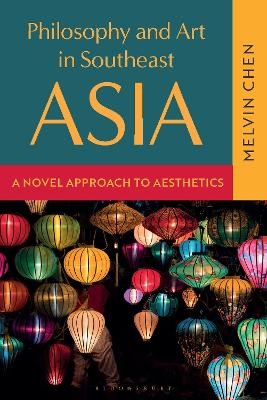
Philosophy and Art in Southeast Asia
A Novel Approach to Aesthetics
Seiten
2024
Bloomsbury Academic (Verlag)
978-1-350-41417-4 (ISBN)
Bloomsbury Academic (Verlag)
978-1-350-41417-4 (ISBN)
Guiding you through the topics that shape aesthetics and the philosophy of art, this introduction explores the truth, meaning, taste, aesthetic merit and judgement, creativity and the possibility of machine art, and morality and the possibility of immoral art. Each chapter offers a wealth of examples from Southeast Asia, including the Nanyang style of painting, the mooi indie genre and its postcolonial legacy, groundbreaking works of poetry and literature, dragon kiln pottery, the art of making ang ku kueh, contemporary conceptual art, the dikir barat and the balitaw.
Selected for their merit, boldness and connection to the Southeast Asian region, these artworks traverse art and craft, visual art and music, perceptual and conceptual art, real-life and hypothetical examples and folk and fine art. As case studies, these artworks allow us to deal with controversies and address central questions including:
- When are artworks considered dangerous?
- Why does Socrates recommend the banishment of the poets?
- What are the problems and challenges posed by forgery?
- How do we resolve ambiguity when interpreting and making sense of works of art?
- Can there be such a thing as immoral art?
A sense of awareness of context and situatedness runs throughout Philosophy and Art in Southeast Asia. The texture, fabric and flavour of each example is woven into a rigorous philosophical analysis of aesthetic and artistic matters.
Making art and aesthetics more relatable, here is a creative and accessible introduction that inspires a love for art and aesthetics. For anyone interested in understanding the cultural underpinnings of aesthetics outside of the traditional canon, it is essential reading.
Selected for their merit, boldness and connection to the Southeast Asian region, these artworks traverse art and craft, visual art and music, perceptual and conceptual art, real-life and hypothetical examples and folk and fine art. As case studies, these artworks allow us to deal with controversies and address central questions including:
- When are artworks considered dangerous?
- Why does Socrates recommend the banishment of the poets?
- What are the problems and challenges posed by forgery?
- How do we resolve ambiguity when interpreting and making sense of works of art?
- Can there be such a thing as immoral art?
A sense of awareness of context and situatedness runs throughout Philosophy and Art in Southeast Asia. The texture, fabric and flavour of each example is woven into a rigorous philosophical analysis of aesthetic and artistic matters.
Making art and aesthetics more relatable, here is a creative and accessible introduction that inspires a love for art and aesthetics. For anyone interested in understanding the cultural underpinnings of aesthetics outside of the traditional canon, it is essential reading.
Melvin Chen is Lecturer in Philosophy and Assistant Chair of Communications & Outreach in the School of Humanities at Nanyang Technological University, Singapore.
Acknowledgements
Introduction
1. The Discipline & Method of Philosophy
2. Art, Truth, Knowledge, & Danger
3. Modes of Aesthetic Knowledge
4. Art, Merit, and Taste
5. Kant's Response to Hume
6. The Ontology of Artworks
7. Forgery
8. Conceptual Art
9. Art and Creativity
10. Art, Interpretation, and Meaning
11. Art and Morality
Conclusion
Bibliography
Index
| Erscheinungsdatum | 22.08.2024 |
|---|---|
| Verlagsort | London |
| Sprache | englisch |
| Maße | 156 x 234 mm |
| Themenwelt | Kunst / Musik / Theater ► Kunstgeschichte / Kunststile |
| Geisteswissenschaften ► Geschichte ► Regional- / Ländergeschichte | |
| Geisteswissenschaften ► Philosophie | |
| ISBN-10 | 1-350-41417-4 / 1350414174 |
| ISBN-13 | 978-1-350-41417-4 / 9781350414174 |
| Zustand | Neuware |
| Informationen gemäß Produktsicherheitsverordnung (GPSR) | |
| Haben Sie eine Frage zum Produkt? |
Mehr entdecken
aus dem Bereich
aus dem Bereich
Erinnerungen
Buch | Softcover (2024)
Pantheon (Verlag)
CHF 22,40


